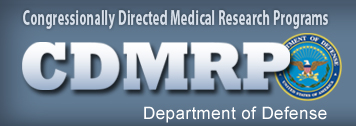
The Congressionally Directed Medical Research Programs announced the four (4) upcoming funding opportunities this week. While applications have not yet been released yet, the pre-announcement allows researchers to begin their research plan for quick turn-around deadlines.
Peer Reviewed Cancer Research Program (PRCRP)
The PRCRP appropriation of $110,000,000 will provide funds for research into cancers not addressed in the breast, pancreatic, prostate, ovarian, kidney, lung, melanoma, and rare cancer research programs. To be considered for funding, applications for the FY20 PRCRP must address at least one of the FY20 PRCRP Topic Areas as directed by Congress. Research applications in the areas of breast, prostate, lung (excluding mesothelioma), kidney, melanoma, pancreatic, rare cancer, or ovarian cancer will not be accepted. The inclusion of the individual rare cancer research program shall not prohibit the PRCRP from funding the below mentioned cancers or cancer subtypes that may be rare by definition.
The FY20 PRCRP Topic Areas are:
• Bladder cancer
• Blood cancers
• Brain cancer
• Colorectal cancer
• Esophageal cancer
• Head and neck cancers
• Immunotherapy
• Liver cancer
• Mesothelioma
• Metastatic cancer
• Neuroblastoma
• Pediatric, adolescent, and young adult cancers (PAYAC)
• Pediatric brain tumors
• Stomach cancer
Opportunities will comprise:
-
PRCRP Cancer Center Director Award
-
Career Development Award – Fellow Option
-
Career Development Award – Cancer Center Scholar Option
-
Idea Award
-
Impact Award
-
Behavioral Health Science Award
-
Translational Team Science Award
More information can be found at https://cdmrp.army.mil/pubs/press/2020/20prcrppreann
Peer Reviewed Orthopaedic Research Program (PRORP)
The purpose of PROP is to support innovative, high-impact, clinically-relevant research to advance optimal treatment and rehabilitation from musculoskeletal injuries. Applications submitted to the FY20 PRORP must address one or more of the following FY20 Focus Areas:
- Compartment Syndrome: Novel treatment strategies to improve current diagnoses for compartment syndrome. Alternatives to intracompartmental pressure measurements are
- Limb Stabilization and Protection: Development and/or clinical assessment of rapid limb stabilization and novel wound protectants for severely wounded limbs to enable transport at the point of need.
- Orthotic Devices: Refinement of high-performance novel orthotic devices designed to enhance whole person performance and decrease pain in patients with limb salvage and impairment.
- Osseointegration: Identification of best practices to address infection, rejection, and/or failure of percutaneous osseointegrated prosthetic limbs.
- Retention Strategies: Development, optimization, and/or validation of battlefield-feasible diagnostic capabilities, decision support tools, interventions, and/or rehabilitation strategies that can facilitate retention on duty for common combat-related musculoskeletal injuries. Biomarker studies are excluded. The current standard of care must be noted. The rehabilitation strategy and the standard of care must be specified, as applicable.
- Point of Injury: Battlefield-feasible strategies that can be utilized at or near the point of injury to allow an injured Service member to remain on duty and stay on mission without the need for immediate evacuation.
- Point of Duty: Strategies that can be utilized along the continuum of care to allow an injured Service member to return to duty without separation from Service.
- Tissue Regeneration Therapeutics: Development of advanced tissue regeneration therapeutics in nerve, muscle (to include volumetric muscle loss), and/or composite tissue for the restoration of traumatically injured extremities. Isolated bone or cartilage tissue engineering studies are excluded.
- Translation of Early Findings: Translation of early research findings in the orthopaedic surgical care topic areas listed below to move the research toward clinical trials and clinical practice.
- Soft Tissue Trauma: Strategies to develop and/or identify musculoskeletal extremity soft tissue trauma treatments for anterior cruciate ligament (ACL) or shoulder instability only, to optimize return to duty, work, or reintegration.
- Fracture-Related Infection: Strategies to decrease the burden of fracture-related infections (may include prevention, early detection, or improved eradication). Alternatives to systemic and/or local antibiotic delivery are encouraged.
Opportunities will include:
More information can be found at:
https://cdmrp.army.mil/pubs/press/2020/20prorppreann
Spinal Cord Injury Research Program (SCIRP)
- Clinical Trial Award
- Investigator-Initiated Research Award
- Translational Research Award
More information can be found at https://cdmrp.army.mil/scirp/default
Tick-Borne Disease Research Program (TBDRP)
- Career Development Award
- Idea Development Award
More information can be found at https://cdmrp.army.mil/tbdrp/default